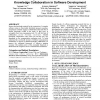Free Online Productivity Tools
i2Speak
i2Symbol
i2OCR
iTex2Img
iWeb2Print
iWeb2Shot
i2Type
iPdf2Split
iPdf2Merge
i2Bopomofo
i2Arabic
i2Style
i2Image
i2PDF
iLatex2Rtf
Sci2ools
105
click to vote
ICSE
2008
IEEE-ACM
2008
IEEE-ACM
The economy of collective attention for situated knowledge collaboration in software development
Because the knowledge required for the construction of a complex software system is often widely distributed among its members, programmers routinely engage in collaboration with each other to acquire knowledge resided in the heads of their peers to accomplish their own programming tasks. We call this kind of collaboration situated knowledge collaboration. Situated knowledge collaboration comes with costs and the costs vary depending on the communication mechanism used. To better understand the cost-benefit structure of different communication mechanisms in support of situated knowledge collaboration, we propose the conceptual framework of collective attention economy. The analytic power of the conceptual framework is illustrated in the comparison of two communication mechanisms. Categories and Subject Descriptors D.2.2 [Software Engineering]: Design Tools and Techniques ? computer-aided software engineering. H.5.3 [Information Interfaces and Presentation]: Group and Organization Inte...
Collaboration Situated Knowledge | Collective Attention Economy | ICSE 2008 | Knowledge Collaboration | Software Engineering |
| Added | 09 Dec 2009 |
| Updated | 09 Dec 2009 |
| Type | Conference |
| Year | 2008 |
| Where | ICSE |
| Authors | Yunwen Ye, Kumiyo Nakakoji, Yasuhiro Yamamoto |
Comments (0)

